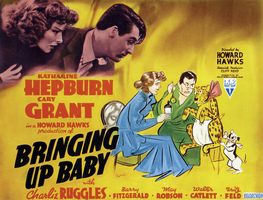
In this article, I will analyse the scene in which David first encounters the dog, George, and Susan’s aunt, Mrs Random, while caught wearing Susan’s dressing gown. I will argue that here a direct comparison can be made between Susan and George. George is used to emphasise that rather than sharing characteristics with a wild leopard, which is how the film is often read, Susan is a mildly troublesome “pet” desiring David as her master.

David meets George and Susan’s aunt and have an interesting exchange.
During the scene Susan mimics a lot of George’s behaviours. Upon his arrival George immediately starts incessantly barking over the dialogue between Susan’s aunt and David, much to David’s annoyance and the audience’s amusement as none of the other characters seem perturbed by the loud noise. He also follows David from the living room into the bedroom, and David shoos him away.
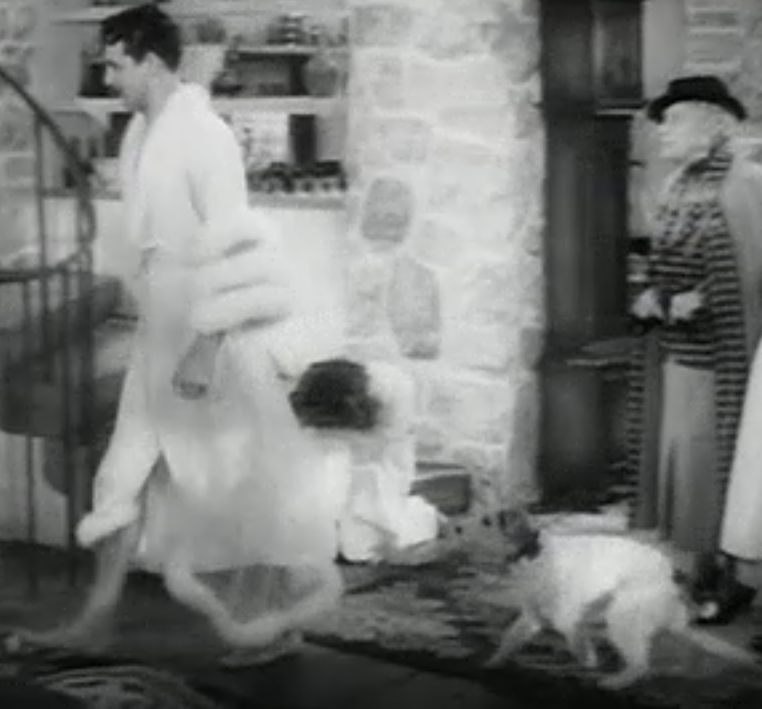
George follows David.
Like George, Susan is also repetitively vocal and follows David around and you half expect him to trip over her. She repeatedly (and annoyingly) asks ‘what have I done wrong?’ ‘what did I do?’ after David becomes exasperated with her and walks away. She then echoes David as he calls for George. This behaviour is similar to George’s barking, as she tries to draw David’s attention to her. As she follows him her behaviour is determined by his own movements as she tries to stay on his heels. The direction he goes must be the direction that she goes if she is to keep it up. This contrasts with the common interpretation of Susan as being a wild animal to be tamed by David. Instead, Susan is offering herself as someone already tamed, willing to follow him. Her mirroring the behaviour of George emphasises this as she reduces herself to the actions of a pet.
However, just because an animal is a pet doesn’t mean it can always be mastered. George still manages to wreak havoc with David by stealing the bone, making them comically chase him around the garden. George is not wild but is still capable of resisting human orders. Similarly, though Susan is trying to make David be her ‘master’ by presenting herself as his pet dog, she still has fun with this and winds him up throughout the film, such as pretending to misunderstand him to exasperate him and getting him into ridiculous situations like being in charge of a leopard.
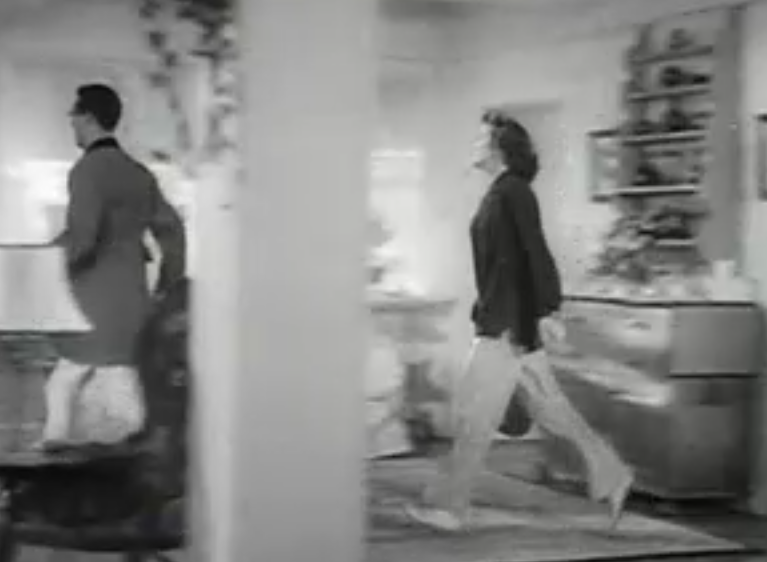
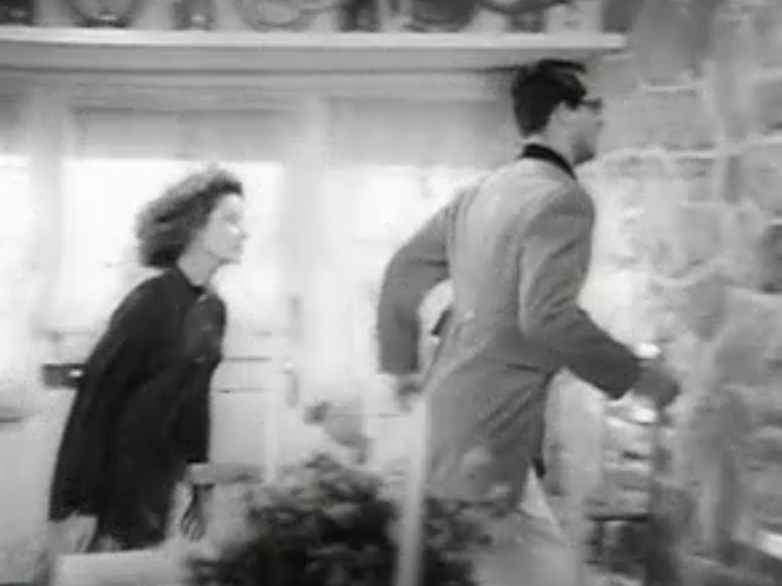
Like George, Susan follows David around the house.
As Susan presents herself as a troublesome but ultimately loyal pet dog in this scene, we see David come to treat her like one. We see him visibly irritated by her, as he is with George. In addition to this, he uses force by standing on her foot to make her be quiet. However, he fails to quieten George, suggesting that he has more dominance over her than over a dog. Their body language also shows his dominance. As he speaks to her, asking her ‘can you concentrate for one minute?’; ‘you understand all that don’t you?’, he is literally speaking down to her as she kneels on the ground next to him, in the same position as a dog would be. She obediently looks up at him, ready to oblige and not objecting to his patronising tone. On the one hand the film here shows dominance from David, however on the other it is inviting us to laugh at his attempts to dominate Susan. Susan is initially introduced as an independent woman causing mischief on her own, crashing cars and playing tricks on people in restaurants. Surely she is not having trouble understanding him. However she realises that she can play with David’s need to assert his masculinity by offering herself as a pet for him to own, so she can win him in the film’s conclusion.
David literally speaks down to her.
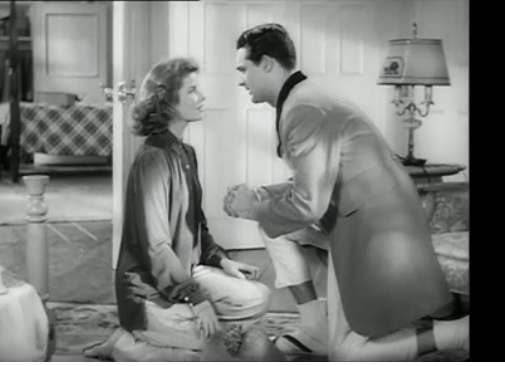
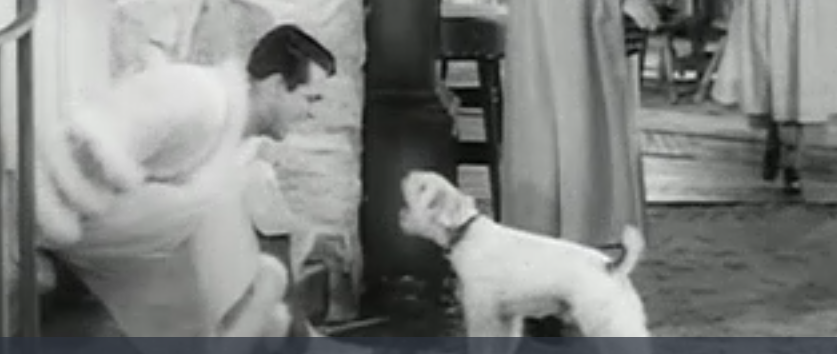
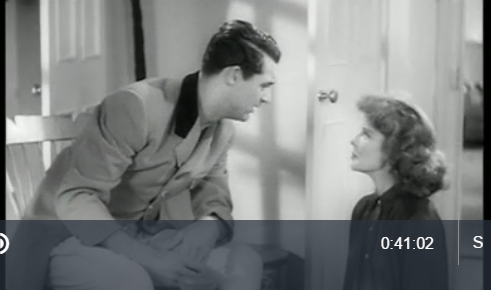
David’s body language towards Susan mirrors his body language towards George.
Both David and Susan’s behaviour throughout this scene mirror that of an owner and their pet dog. Rather than demonstrating Susan’s subordination, it shows how she can play with the male need to dominate and be in charge by acting like a pet but still causing chaos and winding David up. She clearly desires David to be her master, a desire that is achieved in the conclusion of the film. It could be interpreted that David manages to ‘tame’ her by the end of the film, however I argue that Susan won’t be tamed. Even though David is her master, she retains her autonomy and doesn’t always have to comply to his demands- like George can continue to incessantly bark and ignore the command to stop.